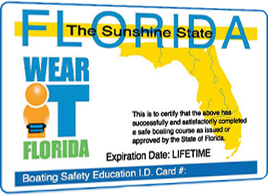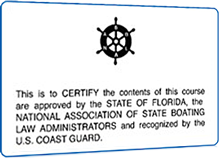Florida Boating Course Details
- The Florida boating course is 100% online
- No classroom attendance is required
- No materials to purchase
- Start boating immediately after receiving your course certificate!
How to get a Boater Education Identification Card


- Complete our course, which is approved by the Florida Fish and Wildlife Conservation Commission (FWC) and the National Association of State Boating Law Administrators (NASBLA). This course includes at least five hours of education on boater safety, end-of-module quizzes, and a final exam.
- Score 80% or better to pass the course exam.
- After you complete this course and pass the final exam, your course certificate will be available to download after five days. Or start boating immediately by purchasing the instant certificate upgrade. Your certificate serves as a temporary boating safety ID card that is valid for 90 days.
- We will report your course completion to the FWC, who will issue you a permanent education identification card.
- Wait for the Florida Fish and Wildlife Commission to issue your permanent education identification card. You can receive a physical card in the mail or an electronic one sent through email.
- You should receive your official digital card from the Commission within 2 weeks of completing the course or the physical card within 3 to 4 weeks.
How to Replace a Lost Boater Education ID Card
To replace a lost boater education identification card, submit proof of course completion to the Commission by email (Bobbercard@MYFWC.com) or the address below. Include your name, date of birth, return address, and phone number.
Florida Fish and Wildlife Conservation Commission
Division of Law Enforcement
Boating Safety Unit
620 South Meridian Street
Tallahassee, FL 32399-1600
Course Topics and Learning Objectives
Our online course is designed to educate boaters on the responsibilities, risks, and regulations that must be understood to legally operate a boat in Florida. It teaches entry-level knowledge required for safe recreational boat operation as determined by NASBLA.
You'll learn about basic boating terminology, types of boats, required equipment, how to plan trips, and other topics critical to safe boat operation. You can find a full outline of the course below.
Module 1: Introduction to Boats and Boating
Topics covered in Module 1 include:
- Basic boat components and vocabulary
- Propulsion methods
- Hull shapes
- Common uses of boats
- Determining boat capacity
Learning objectives include:
- Name and describe the types of boats, including sailing, human-propelled, and power-driving
- List and define parts of a boat and other basic nautical terms
- Explain how to measure a boat's length and determine its length class
- Describe two methods of determining a boat's capacity
Module 2: Required Equipment
Topics covered in Module 2 include:
- Personal floatation devices (PFDs)
- Types of PFDs
- Selecting the right PFD
- Wearing a PFD
- Carrying and stowing PFDs
- Required lights
- Fire extinguishers
- Back-fire flame control device
- Ventilation systems
Learning objectives include:
- Explain how to select, wear, and use personal flotation devices
- List the lights and sound signals required for recreational boats
- Describe the types of visual distress signals required on recreational boats
- Outline the legal requirements for carrying fire extinguishers on recreational boats and describe the types and sizes of fire extinguishers required
- Describe the purpose and maintenance of backfire flame control devices and ventilation systems
Module 3: Planning a Trip
Topics covered in Module 3 include:
- Finding and interpreting weather information
- Finding information about local hazards
- Recognizing and responding to dangerous water conditions
- Checking state and local laws and regulations
- Filing a float plan
Learning objectives include:
- Name sources of information about weather, water conditions, and local hazards, and explain how to interpret this information for the intended trip
- Explain how to identify dangerous weather and why it is important when planning a trip
- Describe the purpose and content of a float plan, to whom it should be submitted, and when it should be cancelled
Module 4: Preparing the Boat
Topics covered in Module 4 include:
- Legal requirements for documenting a boat
- Maintaining a boat
- Towing, launching, and retrieving a boat
- Fueling a boat
- Pre-departure checklist
- Communicating with passengers
- “No-go” conditions
Learning objectives include:
- Explain how to obtain and adhere to local, state, and federal laws and regulations for titling, registering, or documenting a boat
- Describe the importance of preventative boat maintenance
- Outline safe trailering and fueling procedures
- Identify the purpose and content of a pre-departure checklist and critical topics for pre-departure passenger briefings
- List and explain examples of factors that would prompt a “no-go” decision
Module 5: Operating Safely
Topics covered in Module 5 include:
- Operator responsibilities
- Boating proficiency
- Situational awareness
- Safe boating operation
- Determining a safe speed
- Operating small boats
- Unmooring, mooring, and anchoring
- Dangers of boating under the influence (BUI)
Learning objectives include:
- Define the operator's responsibilities for proficiency and situational awareness
- Describe basic safe boating practices and seamanship
- List different types of anchors and the criteria for selecting appropriate anchors and other ground tackle
- Outline procedures for unmooring, mooring, and anchoring a vessel
- Explain the dangers of boating while under the influence of drugs or alcohol
- Highlight the special safety considerations that apply when operating a small watercraft
Module 6: Following Navigation Rules
Topics covered in Module 6 include:
- Inland navigation rules
- Navigation rule situations
- Sound signals
- Navigation light display and recognition
- Distress signals
- Homeland security measures
- Aids to navigation
- Regulatory and informational markers
Learning objectives include:
- Describe typical navigation rule situations and the operator's obligations in each
- Outline homeland security measures related to recreational boating
- Explain the U.S. Aids to Navigation System (USATONS)
- Identify and state the purpose of regulatory and informational markers
Module 7: Avoiding Hazards and Responding to Emergencies
Topics covered in Module 7 include:
- Environmental stressors
- Carbon monoxide
- Propeller safety
- Fire emergency preparedness
- Running aground
- Determining obligation and ability to assist
- Post-incident response procedures
Learning objectives include:
- List and describe common environmental stressors that affect recreational boating
- Identify hazards associated with recreational boats, including carbon monoxide poisoning, propeller strikes, fires, and running aground, and describe practices to prevent or mitigate each
- Explain how U.S. law defines the obligation and ability to render assistance to an individual or boat in distress
- Outline response procedures for capsizing and falls overboard
- List the kinds of accidents that must be reported to state authorities and describe a typical reporting procedure
Module 8: Other Water Activities
Topics covered in Module 8 include:
- Water-jet propelled watercraft
- Water skiing, towing, and wake sports
- Unintended water entry
- Snorkeling and scuba diving
- Hunters and anglers
Learning objectives include:
- Outline safe boating practices and special accident risks for water-jet propelled watercraft
- Explain how to prepare for unintended water entry
- Describe the diver-down flag and the International Code Flag A
- State the legal requirements for operating a boat in the vicinity of snorkeling and scuba diving activities
- List risks hunters and anglers may encounter while boating
Module 9: Protecting the Environment
Topics covered in Module 9 include:
- Aquatic invasive species
- Littering and environmental protection
- Laws related to marine sanitation, oil pollution, garbage, and more
Learning objectives include:
- Describe the impact, risks, and mitigation methods related to aquatic invasive species
- Outline laws and regulations regarding environmental protection and methods for adhering to those requirements
- Describe actions you can take to prevent and respond to aquatic invasive species
Module 10: Boating in Florida
Topics covered in Module 10 include:
- Continuing education
- Florida boating administrative information
- Communication equipment and procedures
- Marine ecosystems
- Florida boating laws
Learning objectives include:
- State the importance of keeping abreast of changing boating laws and guidelines
- List the educational, licensing, and age requirements for operating a vessel in Florida
- Recall the registration, titling, identification, and decal requirements for vessels housed in Florida
- List the required safety equipment and communication procedures needed for handling boating emergencies
- Examine environmental laws and regulations concerning Florida marine ecosystem protection and waste disposal
- Describe “reckless operation of a vessel” and explain what legal penalties an operator may face if charged
- State Florida laws concerning safe boat operation and boating under the influence
- Explain how to document and report a boating accident or theft to Florida authorities
Refund & Payment Policy
You have up to 90 days to complete the online course and test. If you do not complete the course within the allotted time, re-registration (and a new payment of the course fee) will be required. No refunds will be given if you have completed the course. Please review our refund policy for more information.
Testing Policy
By taking this course, you agree to complete online testing without any assistance from another person, the course materials, or other materials.
The course includes a five-question quiz at the end of each course module. You must pass all 10 quizzes with a minimum score of 70%. You have unlimited attempts to pass each quiz.
There is also a 60-question final exam. To pass the exam and qualify for your boater education ID card, you must score at least 80%. You have unlimited attempts to pass the final exam.
Commitment to Privacy
We recognize the importance of protecting your personal information.
- We are committed to safeguarding your privacy online.
- This website does not collect personally identifying information about you except when you specifically and knowingly provide it.
- We take reasonable precautions to protect your personal information.
- When we do collect personal information, we use this to help us better serve your needs, such as through the provision of services or information that may be of interest to you.
- While this information may be made available within our network of affiliated organizations as we provide services to you, we do not sell or rent your name or personal information to any third party.
- We do not sell or rent our mailing list.
This Privacy Policy covers this website's treatment of personally identifiable information that we collect when you are on the website and when you use our services.
Personally identifiable information includes, but is not limited to, first and last name, physical address, zip code, email address, phone number, social security number, birth date, credit card information, financial information, and other sensitive information necessary to provide the associated services.
If, however, we are required by law to comply with a valid legal requirement such as law, federal regulation, search warrant, subpoena or court order, we may be required to release personal information.
Commitment to Data Security
We strive to make certain that our computer systems, servers and connections incorporate the latest encryption and security devices. To prevent unauthorized access, we have implemented procedures to safeguard and secure the information we collect. In addition, credit card and personal information are transmitted to us by secure servers.